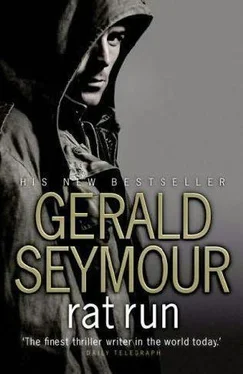Gerald Seymour - Rat Run
Здесь есть возможность читать онлайн «Gerald Seymour - Rat Run» весь текст электронной книги совершенно бесплатно (целиком полную версию без сокращений). В некоторых случаях можно слушать аудио, скачать через торрент в формате fb2 и присутствует краткое содержание. Жанр: Триллер, на английском языке. Описание произведения, (предисловие) а так же отзывы посетителей доступны на портале библиотеки ЛибКат.
- Название:Rat Run
- Автор:
- Жанр:
- Год:неизвестен
- ISBN:нет данных
- Рейтинг книги:4 / 5. Голосов: 1
-
Избранное:Добавить в избранное
- Отзывы:
-
Ваша оценка:
- 80
- 1
- 2
- 3
- 4
- 5
Rat Run: краткое содержание, описание и аннотация
Предлагаем к чтению аннотацию, описание, краткое содержание или предисловие (зависит от того, что написал сам автор книги «Rat Run»). Если вы не нашли необходимую информацию о книге — напишите в комментариях, мы постараемся отыскать её.
Rat Run — читать онлайн бесплатно полную книгу (весь текст) целиком
Ниже представлен текст книги, разбитый по страницам. Система сохранения места последней прочитанной страницы, позволяет с удобством читать онлайн бесплатно книгу «Rat Run», без необходимости каждый раз заново искать на чём Вы остановились. Поставьте закладку, и сможете в любой момент перейти на страницу, на которой закончили чтение.
Интервал:
Закладка:
Nor did he take note of the green-painted delivery van, cab empty, without side windows, that was parked where every other day it was forbidden to stop by the sign that was now covered.
The following night they would cross the frontier into Germany, in the hands of the Albanians… The pistol was now in his waistband, at the back, under his jacket and the coat he wore against the cold. At the street door, he swung round, gazed back up the alley.
No one followed him. No man or woman turned away quickly, or ducked their face to light a cigarette, or snatched a newspaper from a pocket and opened it.
Cars, without slowing, sped past the green van on Kostecna.
He went in, closed the door behind him. The next evening they would start the last leg of the journey. It would end far away on a northern coastline, and there he would hug his man, kiss his cheeks and pray that God walked with him… He began to climb the stairs.
The plaster had flaked from the walls with damp and the light of the alley had been extinguished by the shut street door, but he thought only of his wife…
The Organization had ordered that he should leave his man, his work done, on that seashore.
He lived in paradise but it brought him little comfort.
All his waking hours, worry squirmed perpetually in Oskar.
As the light failed, the rain off the sea thickened and the wind whipped the white caps behind him, Oskar Netzer sat on the bench in the low watch-tower among the island's dunes. At his back, four or five hundred metres behind the tower's wooden plank wall, was the North Sea. What he studied through the tower's hatch window was a lagoon, a bog of rank water and marsh, reeds and the eiders.
The island was at the centre of what would have seemed, if seen from a high aircraft, the long-cleaned vertebrae of a great mammal but one that, in the moment of death, had tucked its legs into its body.
The islands formed an archipelago a few kilometres north of the Frisland coast of Germany. The head of this fallen beast was Borkum island, the base of the skull was Memmert, and Juist was the neck. The shoulders, the largest of the islands, was Norderney.
Then came a bump on the spine: Baltrum. Baltrum was the jewel. The long backbone continued, broken by a channel between Langeoog and Spiekeroog. The creature's drooped tail was Wangerooge, the tip Minsener Oog. Together they acted as a sea wall that protected the mainland from the worst of the winter storms blowing in off the North Sea. The islands had been created over centuries by the tides and currents pushing together displaced mounds of seabed sand.
They had shifted continuously, their basic shapes surviving only when the seeds of the tough dune grass had taken root and bound the sand grains together. They had no soil that could be cultivated and the greenery that had sprouted was only the coarse grass, thick low scrub and occasional weather-bent trees. The upper point of all the individual islands was never more than twenty-four metres over the high-tide sea level. The smallest and the most beautiful, Baltrum, was five thousand metres long and a maximum at low water of fifteen hundred wide.
Baltrum was Oskar Netzer's home.
He was sixty-nine, and five years ago he had watched his wife's coffin lowered into the sand of the small cemetery in Ost Dorp, overlooking the low-tide mudflats and the mainland, after forty-one years of marriage. He loved no other human being and was himself unloved by all of the five hundred permanent residents on Baltrum. He was unloved because he struggles, every day and with every breath, to block the march forward that he was told was necessary if the island's community was to survive. He was wiry, without a trace of fat on his stomach. His cheeks, always seeming to carry three days' bristle, were mahogany-coloured from sun, rain and wind. He wore that day – as all days whether the sun baked or the chill wind cut – a pair of faded blue fishermen's overalls and stout walking boots, with the cap, half rotted, of a Frislander on his silver hair.
A third of his island, his home, was now covered with the little red-brick homes of those who came only in the summer and of those residents who let rooms for the wasp swarms of summer visitors. It was argued by the island's mayor, and the elected council, that visitors needed facilities. Oskar fought each one with passion. The latest, which he would fight that evening at a public meeting, was an application to expand the floor space of an existing Italian-owned fast-food pasta and pizza outlet.
From the tower, he watched the eider ducks feed in the lagoon, preen and sleep on its banks. They were elegant, peaceable and so vulnerable. Each development, he believed, eroded their place on the island.
His anger at development burned in him as he sat on the bench and muttered the arguments – not so loud as to disturb the eiders below him – that he would use later against the intrusion of more strangers. The season for visitors would not start till Easter week; there was still a month before they came. The quiet was around him, and the rumble of the sea far behind him. He would fight because without him the island's calm was shorn of defence and he did not care whose march he blocked.
The note was on the floor just inside the outer door.
Malachy had been in the kitchen cooking sausages and chips. Without the TV's noise through the common wall – and his own was not switched on – it had been deathly quiet in flat thirteen with only the whir of the microwave and the bleep of its bell, but he had heard nothing, no footsteps padding along level three's walkway and no rustle of paper as it was inserted between the bottom of the door and the carpet. He had brought in the plate, with the sausages and chips, and put it on the table. As he had pulled out his chair he had seen the note.
He went to it and bent to pick it up; it was folded in half. His first thought was that it was from Dawn, a report on Mildred Johnson's progress… No, she would have knocked on the door. He lifted it, opened it. Once, handwriting was something he had known about. In the first days at Chicksands, years back, they had spent half a day learning the points to be recognized from handwriting: ill-educated writing, intelligent writing, disguised writing. The hand of this note had formed large, clumsy characters in ballpoint on a sheet from a notepad. The pressure of the point and the size of the letters told Malachy that a right-handed person had written with their left hand.
Your phone will ring three times, then stop. A minute later it rings three more times then stops. After 30 minutes be in the parking area under Block 9, bay 286.
He shivered. Far out over the estate he could hear music played loud and shouts of argument, but around him was silence. He crumpled the paper, then let it drop. He turned to go to the table where the food waited for him, then hesitated and retrieved the note.
This time he ripped it into fragments, carried them to the toilet and flushed them – as if that might help him forget the demand made of him.
An intruder had broken into his world.
He sat at the table and ate his meal. The telephone was on a low table of stained wood. The room's furnishing was basic, battered: a table and two upright chairs, of which only one would safely take his weight, a two-seater settee whose coarse covering was worn on the arms by age and previous tenants, a bookcase with empty shelves. A single picture hung on one wall, a fading print of flowers beside a river; the glass was cracked at the upper left corner. A light with a plastic shade hung from the centre of the ceiling. And there was the low table with the telephone. It was the same as the day on which Ivanhoe Manners had brought him to the Amersham. He had done nothing in those months to stamp his character on the room. In fact, it mirrored Malachy Kitchen. It was as if he had determined to show nothing of himself, as if he were frightened to display himself. What there was he kept clean, but did not add to it.
Читать дальшеИнтервал:
Закладка:
Похожие книги на «Rat Run»
Представляем Вашему вниманию похожие книги на «Rat Run» списком для выбора. Мы отобрали схожую по названию и смыслу литературу в надежде предоставить читателям больше вариантов отыскать новые, интересные, ещё непрочитанные произведения.
Обсуждение, отзывы о книге «Rat Run» и просто собственные мнения читателей. Оставьте ваши комментарии, напишите, что Вы думаете о произведении, его смысле или главных героях. Укажите что конкретно понравилось, а что нет, и почему Вы так считаете.












